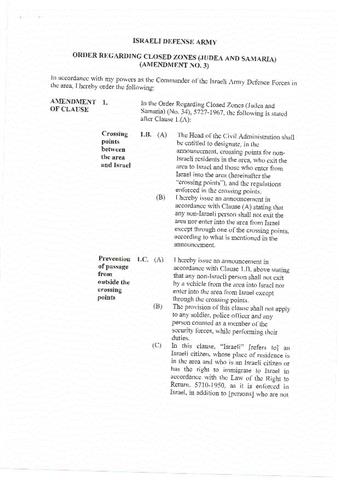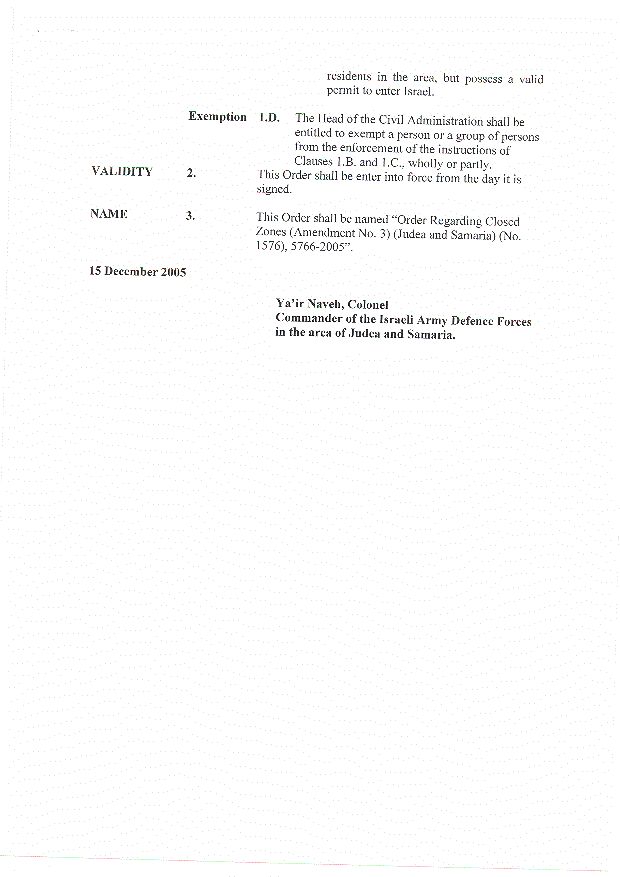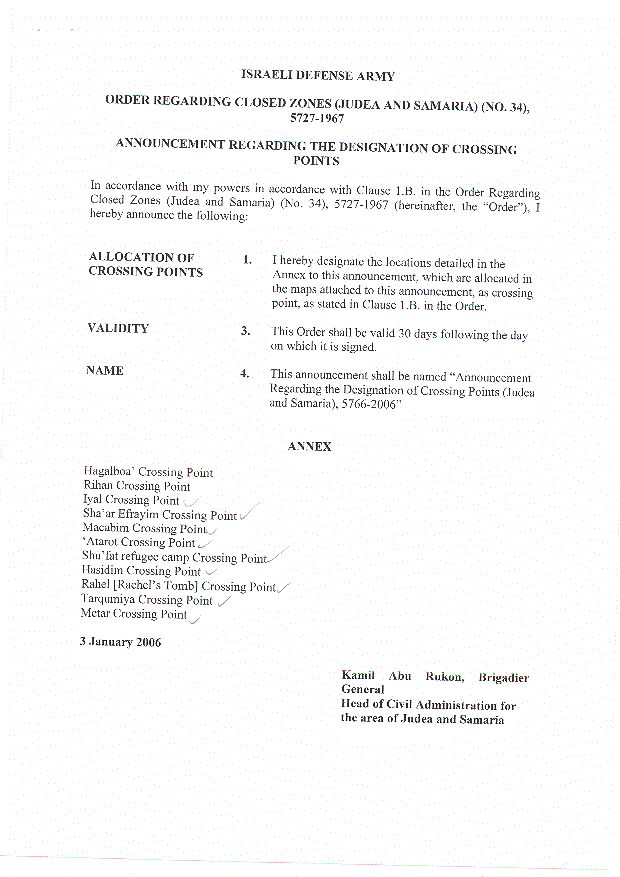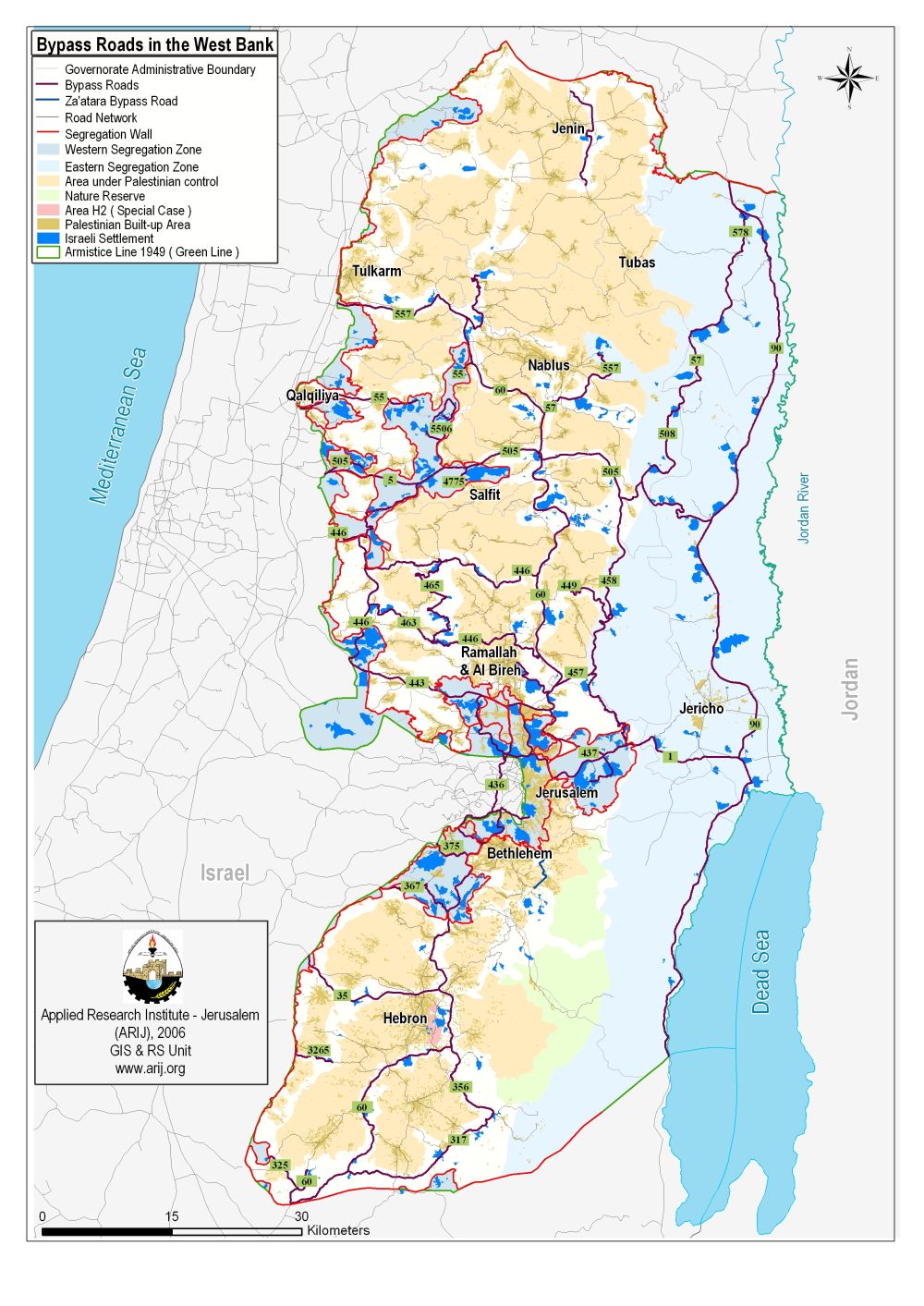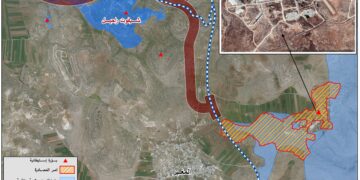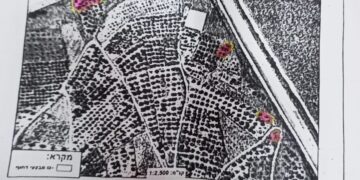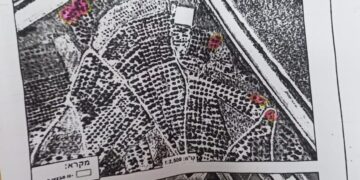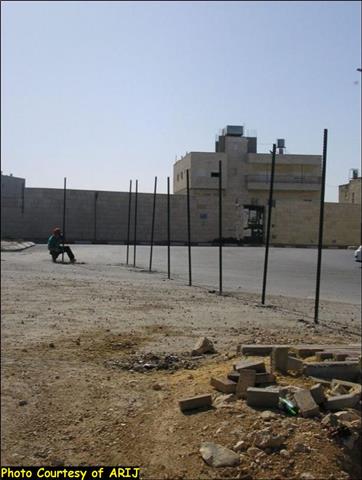It was published in Haaretz daily newspaper on February 18, 2006 that a new military order signed and issued by Major Genral Ya'ir Naveh, the commander of the Israeli defense army in the West Bank forbids Palestinians holding permits from entering Israel via the same roads (Bypass roads) that Israelis use. The new Military order was distributed under the name 'Order Regarding Closed Zones, (Judea and Samaria), (No. 34) 5727-1967' and was issued on December 15, 2005, see translation of military order in English, Page 1 & Page 2.
According to the order, Palestinians holding permits (Issued by the Israeli Civil Administration) are prevented from entering Israel via the same roads (Bypass roads) that Israelis use, and 'Israelis', according to the military order, are not allowed to transport Palestinians holding valid permits to Israel. Access to Israel or Jerusalem should only be through the main crossing terminals (passages) Israel is constructing or already constructed in the West Bank. The crossings, as stated in the second military order issued by the commander of the Israeli defense army in the West (('Order Regarding Closed Zones (Judea and Samaria), (No. 34) 5727-1967, 'Announcement regarding the designation of crossing points') are: Rachel in Bethlehem; Tarqumia crossing in Hebron; Sha'ar Ephraim in Tulkarem; Shu'fat refugee camp Crossing in Jerusalem, Metar Crossing Border (South of Hebron Governorate, inside the Green Line), Hasidim Crossing Border in Jerusalem, in Jerusalem, 'Atarot Crossing Border in Jerusalem, Maccabim Crossing Border (replacing Maccabim road block, located on Jerusalem-Modi'in Highway), Iyal Crossing Border, Rihan Crossing Border in Jenin and Hagalboa' Crossing Border in Nablus. The military order was put into effect during the first half of February 2006. See translation of the military order
The Israeli army has defined 'Israeli' as 'Israeli citizen, whose place of residence in the area and who is an Israeli citizen or has the right to immigrate to Israel in accordance with the law of the right to return, 5710-1950 [See Annex 2], as it is enforced in Israel, in addition to [persons] who are not residents in the area, but possess a valid permit to enter Israel.'
The military order also included an exception to Palestinians who work with international organizations and own long term permits to enter Israel (permits for three months period or so) who will be allowed to enter Israel via two bypass roads that will later be reserved for Israeli use. The roads are, (1) the tunnel's Road (Bypass Road # 60 â?? see annex 1) which connects the Gush Etzion Settlements together and continues north, bypassing the city of Bethlehem and Beit Jala, linking the Gush Etzion bloc of settlements with Gilo settlement in the northwest and Har Homa settlement in the northeast of Bethlehem Governorate and consequently with settlements inside Jerusalem and (2) Hizma Checkpoint, situated at bypass road number 437, at the junction between Hizma and Pisgat Ze'ev settlement. Road 437 connects settlements of Neve Yacov, Pisgat Ze'ev, Pisgat Amir and Almon together and continues east towards the Ma'ale Adumim bloc of settlements..
The Israeli Controlled Roads (Bypass Roads)
The Israeli bypass roads were constructed to facilitate and reinforce the existence of the illegal Israeli settlements in the West Bank. However, the term Israeli ''bypass road'' was utilized during the Oslo negotiations, in September 1993.
According to Bâ??TSELEM report 'The Discriminatory West Bank Road Regimeâ??, issued on October 2004, the bypass Roads fall within three categories, the first of which is 'Completely prohibited roads' where Israel fully forbids Palestinian vehicles from using these roads; the second is 'Partially prohibited roads' which Palestinians are only allowed to travel if they have valid movement permits issued from the nearest District Coordination Office; and the third is 'Restricted use roads' and such roads can only be reached and accessed through an intersection at which the Israeli Occupation Forces retain control through a checkpoint. Palestinians don't have to show permits in order to be able to access a specific road but the Israeli police strictly impose traffic laws on Palestinians and therefore Palestinians have to abide by the Israeli rules on such roads and anyone who violates them will voluntarily be sued.
The Israeli Government had classified the bypass roads (Israeli Controlled roads) to more meet the needs of settlers inhabiting the Israeli settlements situated all over the West Bank and not the Palestinian population although they also can benefit from such roads. See Map of Bypass Roads in the West Bank
Status of Bypass Roads in the West Bank
ARIJ records a total of 794.79 km of Israeli bypass roads inside the West Bank. The construction of which required the confiscation and destruction of more than 80 km�² of Palestinian land, most of which agricultural. The network of checkpoints and crossing borders also allows Israel to control and monitor Palestinian access to the network of bypass road constructed all over the West Bank. Additionally, these roads contribute to the fragmentation and cantonization of the West Bank by carving up Palestinian areas into isolated ghettos and often depriving the Palestinians of the vital agricultural land.
Following the outbreak of the second Intifada in September 2000, Israel has intensified its policy of restricting the Palestinian movement on these roads and such restrictions were and are still exemplified in the continuous establishment of Checkpoints and roadblocks (dirt piles, concrete blocks, trenches, and iron gates) preventing Palestinians from moving freely from one place to another.
Restriction of Movement in International law
The Israeli restriction of Palestinians' movement within the territory they live in affects the exercise of their basic human rights; such as the right to work, the right to health, the right to an adequate standard of living, the right to protection of family life and the right to education, all set in the International Covenant on Economic, Social and Cultural Rights.
-
Article 6: The States Parties to the present Covenant recognize the right to work, which includes the right of everyone to the opportunity to gain his living by work which he freely chooses or accepts, and will take appropriate steps to safeguard this right.'
-
Article 10: The widest possible protection and assistance should be accorded to the family, which is the natural and fundamental group unit of society, particularly for its establishment and while it is responsible for the care and education of dependent children.
-
Article 11: The States Parties to the present Covenant recognize the right of everyone to an adequate standard of living for himself and his family, including adequate food, clothing and housing, and to the continuous improvement of living conditions. The States Parties will take appropriate steps to ensure the realization of this right, recognizing to this effect the essential importance of international co-operation based on free consent.
-
Article 12: The States Parties to the present Covenant recognize the right of everyone to the enjoyment of the highest attainable standard of physical and mental health.
-
Article 13: The States Parties to the present Covenant recognize the right of everyone to education. They agree that education shall be directed to the full development of the human personality and the sense of its dignity, and shall strengthen the respect for human rights and fundamental freedoms.
Article 13 of the Universal Declaration of Human Rights and article 12 of the International Covenant on Civil and Political Rights also entail the right to move freely from one place to another within the state.
-
Article 13:
1. Everyone has the right to freedom of movement and residence within the borders of each State.
2. Everyone has the right to leave any country, including his own, and to return to his country.
-
Article 12:
1. Everyone lawfully within the territory of a State shall, within that territory, have the right to liberty of movement and freedom to choose his residence.
2. Everyone shall be free to leave any country, including his own.
3. The above-mentioned rights shall not be subject to any restrictions except those which are provided by law, are necessary to protect national security, public order, public health or morals or the rights and freedoms of others, and are consistent with the other rights recognized in the present Covenant.
4. No one shall be arbitrarily deprived of the right to enter his own country.
Annexes,
Annex 1
'The Tunnel's Road': bypasses Bethlehem Governorate from the west and separates the western rural areas from the main urban areas. It was constructed following the Oslo II Accords of 1995 and is only used by Israeli residents, Israeli forces, foreigners, and Palestinians who hold valid permits issued by the District Coordination Office in Bethlehem.
Annex 2: Law of Return
|
Right of aliyah** |
1. Every Jew has the right to come to this country as an oleh**. |
|
Oleh's visa |
2. (a) Aliyah shall be by oleh's visa. (b) An oleh's visa shall be granted to every Jew who has expressed his desire to settle in Israel, unless the Minister of Immigration is satisfied that the applicant (1) is engaged in an activity directed against the Jewish people; or (2) is likely to endanger public health or the security of the State. |
|
Oleh's certificate |
3. (a) A Jew who has come to Israel and subsequent to his arrival has expressed his desire to settle in Israel may, while still in Israel, receive an oleh's certificate. (b) The restrictions specified in section 2(b) shall apply also to the grant of an oleh's certificate, but a person shall not be regarded as endangering public health on account of an illness contracted after his arrival in Israel. |
|
Residents and persons born in this country |
4. Every Jew who has immigrated into this country before the coming into force of this Law, and every Jew who was born in this country, whether before or after the coming into force of this Law, shall be deemed to be a person who has come to this country as an oleh under this Law. |
|
Implementation and regulations |
5. The Minister of Immigration is charged with the implementation of this Law and may make regulations as to any matter relating to such implementation and also as to the grant of oleh's visas and oleh's certificates to minors up to the age of 18 years. |
|
DAVID BEN-GURION
|
MOSHE SHAPIRA
|
|
YOSEF SPRINZAK |
|
References
-
'Restrictions on Movement.' The Israeli Information center for Human Rights in the Occupied
Territories. 27 Feb. 2006 http://www.btselem.org/English/Freedom%5Fof%5FMovement/. -
'International Covenant on Economic, Social and Cultural Rights.' Office of the High Commissioner
for Human Rights. 3 January 1976 http://www.unhchr.ch/html/menu3/b/a_cescr.htm. -
'International Covenant on Civil and Political Rights.' Office of the High Commissioner for
Human Rights. 23 March 1976 http://www.unhchr.ch/html/menu3/b/a_ccpr.htm. -
'Universal Declaration of Human Rights.' The General Assembly of the United Nations.
10 December 1948. -
'Law of Return 5710-1950.' Jewish Virtual Library. 10 March 1970 http://www.jewishvirtuallibrary.org/jsource/Immigration/Text_of_Law_of_Return.html.
http://www.btselem.org/English/International_Law/Universal_Declaration.asp#Article13.
Prepared by:
The Applied Research Institute – Jerusalem


